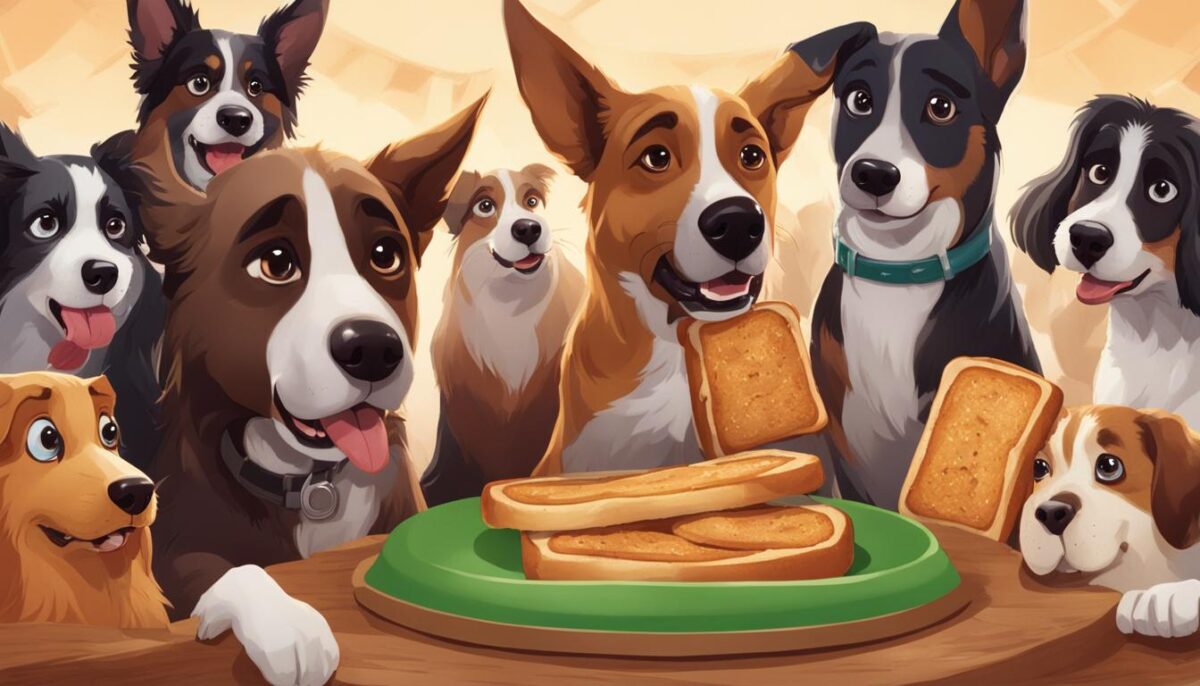Wondering if bread is safe for your furry friends? Dogs eating bread is a common concern among pet owners. Let’s explore the risks of dogs eating bread and find out if it’s a good idea to include bread in their diets.
Dog owners may feel relieved to know that feeding dogs bread is generally safe. To ensure the safety of your pets, keep these points in mind.
The American Kennel Club advises that bread is safe to give to dogs as long as it is . The bread should be plain. It should not have toxic ingredients that could harm your pet.
To keep dogs healthy, avoid bread with raisins or macadamia nuts. These ingredients are dangerous for them. Make sure to offer bread in snack-sized portions. Choose whole-grain breads for their higher nutritional value.
But here’s the catch – bread should not be a regular part of your dog’s diet. Overfeeding dogs with bread can lead to weight gain. It also increases the risk of health issues like heart disease and osteoarthritis.
You are one lucky dog. Mom gave me some of her cheesesteak. That Fat Russell was one lucky dude. Mom thought I'd go for the steak first. I ate the bread. I guess I watch Mom enjoy all those carbs. It has to be good. pic.twitter.com/IoMdqwAdfI
— Auzzy & Never forget Henry & Ice (@HenryandIce) December 11, 2023
Some dogs may have allergies or intolerance to wheat. It is important to be watchful for signs of allergies after giving dogs bread. It is also important to be watchful for signs of upset stomach.
In the sections that follow, we will explore different aspects of dogs. We will also discuss the consumption of bread. We will investigate if dogs can consume toast, including crusts. We will also suggest healthier food alternatives for your furry friend.
Can Dogs Eat Toast?
When it comes to dogs and toast, the good news is that most dogs can enjoy this popular breakfast staple. Plain white or wheat toast is generally safe for dogs. You can give it as an occasional treat. The toast should not have any harmful toppings or ingredients. But, it’s important to keep in mind that toast should not be a regular part of your dog’s diet.
Toast is not good for dogs. It lacks essential nutrients for them. It is high in carbohydrates, which can contribute to weight gain if consumed in excess. So, moderation is key. , you can give your dog a small piece of toast. But, it shouldn’t be a big part of their diet.
If you decide to give your dog some toast, make sure to check their reaction. Some dogs may be allergic to wheat or sensitive to gluten. This can cause digestive problems or other negative reactions. If your dog is uncomfortable, such as vomiting or having diarrhea, do not give them toast again.
Dogs and Toast Crusts: Are They Safe to Eat?
When it comes to sharing your toast with your furry friend, you may wonder if it’s safe for them to munch on those crusts. Toast crusts are generally safe for dogs to eat. They should come from plain white or brown bread. Like with any treat, moderation is key, so it’s important not to overdo it.
Dogs can have toast crusts as a treat, but not too many. Don’t give them crusts every day. The size of the crust should be appropriate for the dog’s breed and weight. Larger dogs can handle a whole crust without digestion problems. Smaller dogs should have a smaller piece to avoid digestion issues.
Take note that not all bread is equal. Do not give your dog bread crusts from seeded or flavored bread. These types of bread may not be safe for dogs. Always choose plain bread. Avoid added toppings or ingredients that could harm your pet’s stomach.
Table: Canine Bread Safety Guide
| Bread Type | Safety for Dogs |
|---|---|
| Plain white or brown bread | Safe, in moderation |
| Seeded or flavored bread | Avoid |
| Bread dough | Avoid at all costs |
Remember, toast crusts can be a tasty treat for your dog. But, they should not replace a balanced and nutritious diet. If you’re worried about giving your dog toast crusts, ask your vet. If your dog experiences unusual symptoms after eating them, seek personalized advice.

Conclusion
When feeding bread to dogs, consider its safety and nutritional value. Dogs can consume bread as an occasional treat, but it should not be a staple in their diet. Bread lacks essential nutrients. It is high in carbohydrates. This can contribute to weight gain. It can also cause health issues like heart disease and osteoarthritis.
There are many bread alternatives for dogs instead of relying on bread. You can incorporate these alternatives into a dog’s diet. Fruits and vegetables have vitamins, minerals, and fiber. These are good for dogs. Consulting with a veterinarian is important for determining your dog’s diet. The diet should be appropriate for your dog’s specific needs.
It is also crucial to check your dog’s reaction to bread. Some dogs may have digestive issues or allergies related to wheat or gluten. If your dog has an upset stomach after eating bread, you should consult a veterinarian. Seek guidance from a veterinarian if your dog is allergic to bread.
Keeping your dog’s diet balanced and nutritious is essential for their health. Remember, it’s key to their well-being. You can help keep your furry friend happy and healthy by making informed choices. Consider alternatives to bread.
FAQ
Is it safe for dogs to eat bread?
According to the American Kennel Club, it is safe to feed dogs bread as long as it is. But, it is important to ensure that the bread is plain and does not contain any toxic ingredients.
Can dogs eat toast?
Most dogs can eat toast, provided they do not have a wheat allergy or gluten sensitivity. Plain white or wheat toast is generally safe for dogs to enjoy as an occasional treat.
Are toast crusts safe for dogs?
Toast crusts are generally safe for dogs to eat, as long as they are plain and from white or brown bread. Dogs can enjoy toast crusts as a treat, but it is important not to feed them too many crusts or give them every day.
Is bread a healthy choice for dogs?
Bread has limited nutritional value for dogs and should not be a regular part of their diet. Overfeeding dogs with bread can cause weight gain in them. Weight gain can increase the risk of health issues. These issues include heart disease and osteoarthritis.
What are some alternatives to bread for dogs?
You can add fruits and vegetables to a dog’s diet as healthier alternatives to bread. Monitoring a dog’s reaction to bread is essential. Consult a veterinarian if there are concerns about digestion or allergies.
